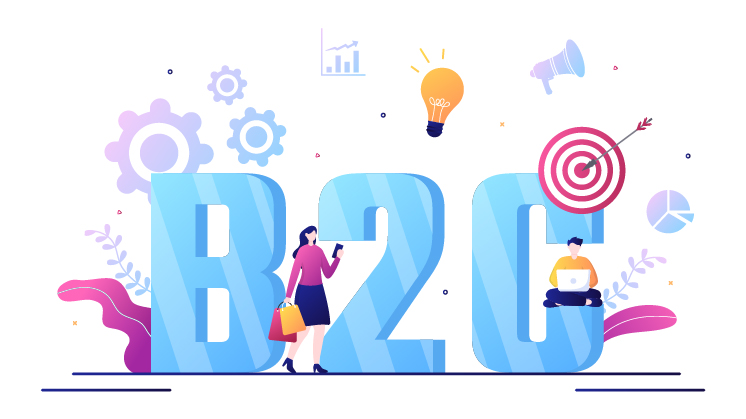You may have noticed that there are two main types of eCommerce stores: B2C and B2B. But what are the differences between them? And which one is right for your business?

In this article, we’ll look at the critical differences between B2C and B2B eCommerce stores. We’ll also help you decide which one from b2b vs b2c is right for you.
What Is B2C eCommerce?

When most people think of eCommerce, they immediately think of B2C (business-to-consumer) transactions. This is where a business sells directly to the end consumer, cutting out the need for a middleman.
B2C eCommerce is incredibly popular, thanks to its ease and convenience. Consumers can browse and buy products from anywhere in the world, and they can do it at any time of the day or night. There are no geographical boundaries and no need to wait for business hours to make a purchase.
Plus, B2C eCommerce is perfect for products that are impulse buys. We all know that feeling of seeing something we just have to have and being able to purchase it straightaway is a huge draw.
What Is B2B eCommerce?

B2B eCommerce is the buying and selling of products or services between businesses. It’s a process that has been made easier in recent years with technological advancements, and it’s something that more and more companies are taking advantage of.
There are a few critical differences you need to know regarding B2B vs B2C eCommerce. The first is that B2B transactions are typically larger in scale. Businesses buy products or services for resale or use in their operations.
Another key difference is that B2B eCommerce typically involves a longer buying cycle. This is because businesses will need to research different suppliers, compare quotes and decide based on several factors.
Finally, B2B eCommerce transactions are often more complex than B2C transactions. This can be due to the fact that there are more stakeholders involved or because the products or services being bought and sold are more complex.
The Differences Between B2C & B2B eCommerce Stores
When it comes to eCommerce, there are two main types of stores: B2C and B2B.
B2C stores sell to consumers, while B2B stores sell to other businesses. There are a few key differences between the two:
- B2C stores usually have a more comprehensive range of products, as they need to appeal to various customers. B2B stores, on the other hand, typically specialize in one or two types of products.
- B2C stores usually have a lower price point as they’re looking to attract a wide range of customers. B2B stores usually have a higher price point, targeting businesses willing to pay more for quality products.
- B2C stores usually have a more straightforward checkout process, focusing on making it as easy as possible for customers to buy products. B2B stores often have a more complex checkout process, as they need to gather more information from their customers.
So, which type of store is right for you? That depends on your business and what you’re looking for in an eCommerce solution.
Marketing Strategies for B2C & B2B Merchants

When it comes to marketing, B2C and B2B merchants have different strategies. For example, B2C marketers focus more on aesthetics. They use vibrant visuals, attractive images, and clever copywriting to create a unique customer experience. On the other hand, B2B marketers need to focus more on informing potential customers about the features and benefits of their products or services.
Social media is another area where the two types of eCommerce stores can differ. While B2C merchants might prioritize visual platforms like Instagram or Pinterest, B2B merchants may prefer LinkedIn or Twitter to better engage with potential customers and business partners. According to B2B marketers, more than 80% of all social media leads come from LinkedIn.
No matter what kind of eCommerce store you have, it’s essential to consider how to reach your target audience best and create a marketing strategy that works for you. That way, you can start building customer relationships that will last for years!
Customer Engagement Differences for a B2C & B2B Business
Now that we’ve gone over what distinguishes B2C from B2B, let’s dive a bit deeper into how customer engagement differs between the two.
When it comes to B2C, the focus is entirely on selling your product and providing excellent customer service to ensure that this target consumer keeps coming back for more. This means everything from optimized website design to providing timely customer support. According to B2C marketers, a 5% increase in customer retention can boost the organization’s revenue anywhere between 25-95%.
On the other hand, for a B2B business, you’ll have to build relationships with your customers, listen to their particular needs, and show that you understand their businesses.
For example, you may have to offer discounts or customizations to meet their needs better. You may also need to provide technical support examples or resources so they can get up and running quickly — something that isn’t typically needed in an entirely consumer-focused space.
How to Choose the Right Model for Your eCommerce Business
Now that you understand the differences between a B2C and a B2B eCommerce platform, you’re probably wondering which is best for your business. The answer depends on your goals and what you hope to get from an e-commerce store.
If your goal is to drive sales from individual consumers at home, then a B2C platform is likely the best choice for you. When deciding, consider factors such as scalability, customer experience, product returns, and shipping.
On the other hand, if you’re looking for more control over pricing and more flexibility in managing orders from large businesses with multiple buyers, then a B2B eCommerce platform could be the right choice for you. Research features such as bulk discounts, special pricing agreements, product lots/kits, and integrations that can automate processes such as invoicing to ensure they will fit your business needs.
If you want to capitalize on a hybrid approach to targeting B2C and B2B customers, you can comfortably witness your business grow. Such an approach is considered less risky as you’ll be able to sell retail and wholesale. However, you’ll need to install a wholesale plugin on your WooCommerce store.
This plugin will give your eCommerce store all the functionalities a wholesale online store requires. That way, you’ll be able to sell to both types of customers.
Wrap Up
There are a few vital differences between B2C and B2B eCommerce stores. Firstly, B2B eCommerce stores generally offer a more comprehensive range of products and services, as businesses buy for their own use rather than for personal use. B2B eCommerce stores also tend to be more complex, with more features and a more profound checkout process.
Finally, B2B eCommerce stores usually have a more professional design to convey trust and authority. This can be important for businesses, as they must ensure that their customers are confident in the store’s legitimacy.
Overall, B2B eCommerce stores offer a more comprehensive and professional shopping experience, which is why they are growing in popularity. However, you can choose the type of business you wish to run according to your product and market.


